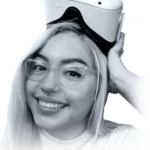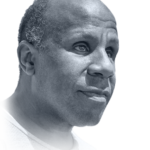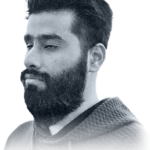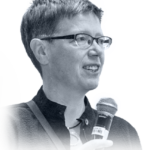The 2022 Agenda
Previous Agendas: 2021 Agenda, 2020 Agenda.
-
Main Stage
Day 1: Welcome to Sight Tech Global
Speakers
-
Brian Fischler, Host, Sight Tech Global

-
Karae Lisle, Chief Executive Officer, Vista Center for the Blind and Visually Impaired

Concluded- PT -
-
Breakout
Augmenting Access to the IoT with HumanWare AT
The Internet of things, or IoT, loosely refers to todays landscape of connected devices in both how they network with each other and the cloud. IoT plays a major roll in all our daily lives. From having your smart speaker adjust the thermostat to tapping your watch on a rapid transit reader, or ordering food through a kiosk, we are living in a world with over 7 billion connected devices. While much of the IOT is accessible to someone who is blind, at times awareness of how to interact with these “things,” can be challenging. Assistive technology can serve as either a conduit to more efficiently access the connected world, or as an augmentation to vastly improve the user experience. This presentation will explain how HumanWare is using machine and deep learning technologies to provide more complete access to the connected world. We will look at currently available devices, as well as where we are heading in the future.Presenters
- Louis-Philippe Massé, Vice-president of Product Innovation and Technologies, HumanWare
- Peter Tucic, Director of Strategic Partnerships, HumanWare
Concluded- PT -
Main Stage
The Dynamic Tactile Device: That "Holy Braille" for education is near
Following up on last years' discussion of the APH and Humanware collaboration to create an education-focused tactile display (see next session), Greg Stilson updates Sight Tech Global on the project's progress and APH's work toward an SDK for developers to build on the tactile display. Greg Stilson will also lead a breakout session for attendees who want to go deeper on the Dynamic Tactile Device.Speakers
-
Greg Stilson, Vice President, Digital Transformation, The American Printing House for the Blind

-
Moderator: Devin Coldewey, Writer & Photographer, TechCrunch

Concluded- PT -
-
Main Stage
The DOT Pad: How the bible inspired a breakthrough
For decades, engineers have worked toward a Braille display that can render tactile images and multi-line Braille. DOT Pad may have cracked the code with an innovative approach to generating dynamic fields of Braille pins combined actuated by smart integrations with existing technologies, like Apple's VoiceOver. Eric Kim and Ki Sung will also lead a breakout session for attendees to want to learn more.Speakers
-
Ki Kwang Sung, Co-founder, Dot Inc.

-
Eric Ju Yoon Kim, Co-founder/CEO, Dot Inc.

-
Moderator: Devin Coldewey, Writer & Photographer, TechCrunch

Concluded- PT -
-
Main Stage
Virtual reality and Inclusion: What does non-visual access to the metaverse mean?
People with disabilities and accessibility advocates are working to make sure the metaverse is accessible to everyone. This panel will delve into research on the challenges current virtual and augmented reality tools create for people who are blind or have low vision.The panelists will share their experiences using immersive technologies and explore how these tools can be used to enhance employment opportunities in hybrid and remote workplaces – but only if they are built with inclusion in mind.Speakers
-
Alexa Huth, Director of Strategic Communications, The Partnership on Employment & Accessible Technology (PEAT)

-
Brandon Biggs, CEO, XR Navigation

-
Aaron Gluck, Ph.D. candidate in Human-Centered Computing, Clemson University

-
Moderator: Bill Curtis-Davidson, Co-Director, The Partnership on Employment and Accessible Technology (PEAT)

Concluded- PT -
-
Breakout
The DOT
Hardware takes a long time to build, test and take to market, especially a specialized market like the one for people witout vision. Hear from DOT's founders about the lessons they learned along the way as well as the challenges that stil lie ahead.Presenters
- Eric Ju Yoon Kim, Co-founder/CEO, Dot, Inc.
- Ki Kwang Sung, Co-founder/CBDO, Dot, Inc.
Concluded- PT -
Breakout
How AI image generating tools could be helpful or harmful
Every week it seems there is a new tool released to generate images using AI. How might these tools be used in a way that increases inclusion? What are the risks we currently face with AI generated images furthering exclusion? This session will be an interactive exploration of AI image generation (with descriptions) and how it could impact disability representation, alternative text, and facilitate blind people as image creators. Help guide Kate’s live exploration and discover what images are generated from the prompts chosen from audience participation.Presenter
- Kate Kalcevich, Head of Accessibility Innovation, Fable
Concluded- PT -
Main Stage
Inventing the "screenreader" for VR: Owlchemy Labs' Cosmonious High
For developers of virtual reality games, there's every reason to experiment with accessibility from the start, which is what the Owlchemy Labs team did with Cosmonious High, the 2022 release of a fun, first-person game situated in a inter-galactic high school that one reviewer said "has all the charm and cheek of a good Nickelodeon kids show." And it reveals some of the earliest approaches to accessibility in VR.Speakers
-
Peter Galbraith, Accessibility Engineer, Owlchemy Labs

-
Jazmin Cano, Accessibility Product Manager, Owlchemy Labs

-
Moderator: James Rath, YouTuber/Creator, TV show host, Accessibility Consultant

Concluded- PT -
-
Main Stage
Audio Description the Pixar Way
AI-based, synthetic audio description may have a place in some forms of accessible video content, but the artistry of the entirely human-produced audio descriptions Pixar produces set a creative standard no AI is likely attain, and that's all for the good. Meet members of the Pixar team behind excellence in audio descriptions.Speakers
-
Anna Capezzera, Director, Audio Description Operations, Deluxe

-
Eric Pearson, Home Entertainment Product Supervisor, Pixar Animation Studios

-
Laura Post, Voice Actress

-
Christina Stevens, Writing Manager, Audio Description department, Deluxe

-
Moderator: Thomas J. Wlodkowski, Vice President of Accessibility, Comcast

Concluded- PT -
-
Main Stage
Accessibility is AI’s Biggest Challenge: How Alexa Aims to Make it Fairer
Smart home technology, like Alexa, has been one of the biggest boons in recent years for people who are blind, and for people with disabilities altogether. Voice technology and AI help empower people in many ways, but one obstacle stands in its way: making it equitable. In this session, learn from Amazon about how they’re approaching the challenge ahead.Speakers
-
Peter Korn, Director of Accessibility, Devices & Services, Amazon

-
Dr. Joshua Miele, Principal Accessibility Researcher, Amazon

-
Moderator: Caroline Desrosiers, Founder & CEO, Scribely

Concluded- PT -
-
Main Stage
See you tomorrow!
Speakers
-
Brian Fischler, Host, Sight Tech Global

-
John Glass, Chairman of the Board, Vista Center for the Blind and Visually Impaired

Concluded- PT -
-
Main Stage
Day 2: Welcome to Day 2 of Sight Tech Global
Speakers
-
Brian Fischler, Host, Sight Tech Global

Concluded- PT -
-
Breakout
Paving the "Holy Braille" Highway
APH and HumanWare continue to drive forward in developing the Dynamic Tactile Device (DTD), bringing innovative technology from DOT Inc., and creative ideas from leaders in the braille community together, building a solution referred to as the "Holy Braille." In this breakout session, Greg Stilson will share developments on the DTD's ecosystem and how educational content will be delivered to students as never before. See how DTD applications can enable students to study, shop, play games, and more. Share insights to assist in maximizing the usefulness of this innovative tool.Presenter
- Greg Stilson, Head of Global Innovation, The American Printing House for the Blind (APH)
Concluded- PT -
Main Stage
A deep dive into Apple’s industry-leading screen-reader, VoiceOver
Learn how Apple's Accessibility team is harnessing innovations across hardware, software, and machine learning to support users who are blind or low-vision. Hear what’s new in VoiceOver, and other vision accessibility tools across Apple devices.Speakers
-
Dean Hudson, Accessibility Evangelist, Apple

-
Areeba Kamal, Accessibility Product Manager, Apple

-
Moderator: Matthew Panzarino, Editor-in-Chief, TechCrunch

Concluded- PT -
-
Main Stage
Hands on with Seleste
Rapid advances in phones, data networks, and hardware miniaturization always seem to be converging on the concept of that super useful, affordable, unobtrusive assistive device. Seleste launches this year with a pair of tech-enabled glasses that mark an important waypoint on that journey.Speakers
-
Shubh Mittal, Founder, Seleste

-
Smit Patel, Co-founder, Seleste

-
Moderator: Jennison Asuncion, Head of Accessibility Engineering Evangelism, LinkedIn

Concluded- PT -
-
Breakout
Building a More Inclusive and Accessible World Through Innovation and Collaboration
Join the American Council of the Blind for a conversation to learn how the built environment is becoming more accessible and independently navigable for people who are blind. In this session, ACB will host a conversation with representatives from Verizon Communications, Way Map, and Way Finder Family Services to share how technology developers, service providers, and the blindness community are collaborating to solve long-standing issues through the adoption of new technologies. We will discuss the latest innovations in way finding and navigation technology, learn how they are helping to meet the needs of people who are blind, and postulate how these services might be enhanced in the future. Here are helpful videos from Way Map and Verizon / Way Map describing their work.Presenters
- Zachary Bastien, Manager, Strategic Alliances, Verizon
- Eric Bridges, Executive Director, American Council of the Blind
- Allison Burdett, Associate Vice President, Visual Impairment and Developmental Disabilities Services, WayFinder Family Services
- Clark Rachfal, Director of Advocacy and Governmental Affairs, American Council of the Blind
- David Shaffer, Vice President and General Counsel, Waymap
Concluded- PT -
Main Stage
Hands on with ARx
Like Seleste, ARx is another recently released device designed to take advantage of the technology tech platforms that surround everyday life with a private, minimally visible, heads-mounted device. Both the Seleste and ARx leaders will discuss what they've learned in the course of developing and testing their devices.Speakers
-
Charles Leclercq, CEO, ARx Vision

-
Moderator: Lucy Greco, Accessibility Advocate

Concluded- PT -
-
Breakout
Breaking down barriers to STEM learning with AI/ML
While we now have the technology for converting a novel like War and Peace into accessible formats, converting STEM education materials remains a challenge. Making these books accessible today requires a lot of human effort. The average math textbook contains over 5,000 equations, and it can take three to four months for a specialist to transform a print math book into accessible formats. But with AI-driven approaches, we can reduce the conversion time from months to minutes. Benetech has built and trained an AI engine that uses machine learning and computer vision to identify, classify and convert math equations and images into MathML. It converts a PDF document into an accessible EPUB in a matter of seconds. With this solution, we are marching towards achieving our vision of creating equity and inclusion in STEM education by bridging the gap in availability of accessible STEM educational materials.Presenters
- Hema Natarajan, Product Manager, Benetech
- Charles LaPierre, Principal, Accessibility and Content Quality Architect, Benetech
Concluded- PT -
Main Stage
What's Next with StellarTrek
Where Seleste and ARx are newcomers to assistive devices, Humanware is a highly respected, established player whose new StellarTrek also takes powerful advantage of technology advances but also parts way with the newscomers when it comes to technology architecture and form factors.Speakers
-
Dr. Louis-Philippe Massé, Vice-president of Product Innovation and Technologies, HumanWare

-
Peter Tucic, Director of Strategic Partnerships, HumanWare

-
Moderator: Samuel Proulx, Accessibility Evangelist, Fable

Concluded- PT -
-
Main Stage
The Problem with AI
Despite the stunning advances in AI over the past decade, the so-called "deep learning" AI technology prevalent today has under-appreciated limitations and even poses societal dangers. Our speakers are world-renowned AI experts and AI "dissenters" who believe we need an AI that's both more accountable and better able to produce common sense results.Speakers
-
Dave Ferrucci, Founder & CEO, Elemental Cognition

-
Gary Marcus, Founder and Executive Chairman, Robust.AI

-
Moderator: Ned Desmond, Founder and Fmr. Executive Producer, Sight Tech Global

Concluded- PT -
-
Main Stage
Did Computer Vision AI Just Get Worse or Better?
The ability an assistive tech devices to recognize objects, faces, scenes is a type of AI called Computer Vision, which calls for building vast databases on images labeled by humans to train AI algorithms. A new technique called "one-shot learning" learns dramatically faster because the AI trains itself on images across the Internet. No human supervision needed. Is that a good idea?Speakers
-
Danna Gurari, Assistant Professor, University of Colorado Boulder

-
Moderator: Cecily Morrison, Principal Researcher, Microsoft Research Cambridge

Concluded- PT -
-
Main Stage
AI Decision Systems Permeate Our Lives. Now what?
AI decision systems have permeated most of the critical decisions within our society. They shape our views, wants, friendships, hates and fears. They influence who is hired, fired, admitted, prioritized for healthcare, funded, voted for, and seen as a security threat. It is argued that current AI systems are mechanizing eugenics and segregation. They automate, amplify, and accelerate past discrimination more efficiently, accurately, and consistently. What is the impact if you have a disability? AI is also poised to make the next leap, moving beyond statistical modelling based on big data sets. What are the opportunities and risks of emerging forms of AI?Speakers
-
Merve Hickok, Founder, AIethicist.org

-
Clayton Lewis, Emeritus Professor of Computer Science, University of Colorado Boulder

-
Moderator: Jutta Treviranus, Director, Inclusive Design Research Centre

Concluded- PT -
-
Main Stage
What Waymo learned at the DOT Inclusive Design Challenge
Waymo participated in the US Department of Transportation Inclusive Design Challenge, and emerged with numerous accessibility lessons and features that will help Waymo's autonomous rides offer people with disabilities better service. Waymo's team is still processing all they learned.Speakers
-
Lauren Schwendimann, UX Design Lead & Manager, Waymo

-
Jeffrey Colón, Director of Access Technology, Lighthouse for the Blind

-
Moderator: Mike May, Chief Evangelist, Goodmaps

Concluded- PT -
-
Main Stage
Thank You and Final Remarks
Speakers
-
Brian Fischler, Host, Sight Tech Global

-
Alice Turner, Director of Community and Corporate Relations, Vista Center for the Blind and Visually Impaired

Concluded- PT -
